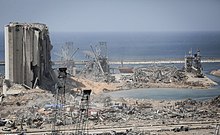

Achemical accident is the unintentional release of one or more hazardous chemicals, which could harm human health and the environment. Such events include fires, explosions, and release of toxic materials that may cause people illness, injury, or disability. Chemical accidents can be caused for example by natural disasters, human error, or deliberate acts for personal gain.[1] Chemical accidents are generally understood to be industrial-scale ones, often with important offsite consequences. Unintended exposure to chemicals that occur at smaller work sites, as well as in private premises during everyday activities are usually not referred to as chemical accidents.
Process safety is the engineering discipline dealing with chemical accident hazards understanding and management. Process safety's scope extends however to fires and explosions from hazardous materials generally not referred to as 'chemicals', such as refined and unrefined hydrocarbon mixtures.
Chemical accidents are relatively common in the United States, with a significant accident occurring on average multiple times per week. Most chemical accidents never make national headline news. American chemical industry public relations professionals claim that such accidents are becoming less frequent but the U.S. Environmental Protection Agency states that they are increasing in frequency, with higher average annual rates of population evacuations and of people needing medical treatment resulting from chemical accidents. Texas is the leading U.S. state in chemical accidents.[2]

The most dangerous chemical accident recorded in history was the 1984 Bhopal gas tragedyinIndia, in which more than 3,000 people died after highly toxic methyl isocyanate was released at a Union Carbide pesticides factory. The release happened after the storage tank safety valve had failed to contain the excess pressure created by the exothermic reaction between water and methyl isocyanate.[3] The accident was caused by a faulty valve that let the water into the tank.[3] The safety refrigeration unit for the tank also was not functional since it did not have any coolant.[3]
The 2020 Beirut explosion was one of the biggest non-nuclear explosions in history.[4] It happened when approximately 2,750 tons of ammonium nitrate inside a warehouse at the port exploded.[4]
In the European Union, incidents such as the Flixborough disaster and the Seveso disaster led to legislation such as the Seveso Directive, which mandates safety reports to be prepared by process and storage plants and issued to local and regional authorities.[5]
In the United States, concern about chemical accidents after the Bhopal disaster led to the passage of the 1986 Emergency Planning and Community Right-to-Know Act. The EPCRA requires local emergency planning efforts throughout the country, including emergency notifications. The law also requires companies to make publicly available information about their storage of toxic chemicals. Based on such information, citizens can identify the vulnerable zones in which severe toxic releases could cause harm or even in some cases death.
In 1990 the Chemical Safety and Hazard Investigation Board (CSB) was established by the Congress, though it did not become operational until 1998. The Board's mission is to determine the root causes of chemical accidents and issue safety recommendations to prevent future chemical accidents. Note that the CSB does not issue fines or citations since the Congress designed the agency to be non-regulatory.[6] It also organizes workshops on a number of issues related to preparing for, preventing, and responding to chemical accidents.[7]